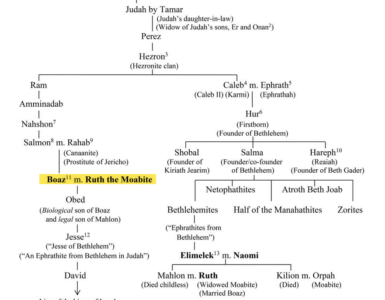 Did you know the book of Psalms is the Old Testament book most often quoted in the New Testament? And its quotations can be found in global literature, everywhere from poetry to television scripts to government speeches. Why is this scriptural book so popular?
Did you know the book of Psalms is the Old Testament book most often quoted in the New Testament? And its quotations can be found in global literature, everywhere from poetry to television scripts to government speeches. Why is this scriptural book so popular?
Bible Gateway interviewed Sandra L. Richter (@sandralynrichter), author of The Epic of Eden Book of Psalms Video Study: An Ancient Challenge to Get Serious About Your Prayer and Worship (Zondervan, 2021).
Please explain what The Epic of Eden series is.
Dr. Sandra L. Richter: The idea for The Epic of Eden curriculum series was birthed in a late-night conversation in a friend’s kitchen. I was in my first post at Asbury Theological Seminary and had just published, The Epic of Eden: A Christian Entry into the Old Testament (IVP 2008). I had also developed a weekend intensive for churches and conferences that got folks through the material in about eight hours of face time. The objective for both? To help people “put their Bibles together” by giving them back their Old Testaments.
Well, the weekend intensive had gotten so popular that I was overwhelmed with invitations and travel while trying to raise my babies and keep my day job! It was that dilemma that triggered the conversation. My friend was visionary JD Walt, now of Seedbed, who said, “Let’s put it on video.” To which I responded, “Yeah, right. You’ve noticed I’m an academic, right? Who does that?”
Well, in 2008 maybe not too many. But he was right, and we did it. The first thing we filmed was that weekend intensive, and published it as The Epic of Eden: Understanding the Old Testament. A 12-week study with as many videos and a 5-day-a-week individual study guide. Filming late at night after classes were done, scrambling to come up with a format for the guide, finding writers for the guide, giving up on the writers for the guide, what a ride that was! But the curriculum dropped in 2014 and was enormously successful. Then we filmed the books of Isaiah, Ruth, and Jonah—and people keep asking for more. This next study is The Book of Psalms (website), now with HarperCollins.
We’ve come a long way from that first study and those midnight filming sessions, but the heart of the matter has always been the same: To give people back their Bibles. To get the best of scholarship, archaeology, and ministry into the hands of the everyday believer. To bring the real people and places of the Old Testament to life so we can understand their real faith! The studies range from 6-to-12 weeks, the study guides are contemporary and challenging. And Epic of Eden: Psalms? Well, I hope it’s the bomb.
What is the book of Psalms? Who wrote it? And why is it in the Bible?
Dr. Sandra L. Richter: As I tell my students all the time, the best way to think about the book of Psalms is to think about a hymn book. Just like the hymnbook in your church, the book of Psalms is an anthology of prayers and praises collected by the community of faith for hundreds of years, to serve the people of God in worship. And for those who know what they’re looking for, this anthology has a table of contents, a list of authors, suggested and alternate melodies, instructions for the choir and orchestra, as well as the particular feasts and celebrations in which a particular piece is best used.
Why is it in the Bible? The same reason your hymnal is in your pew! To offer the community of faith a culled collection of the very best of the past and present praises and prayers of the people of God so that we can get about the business of worship.
It only takes a minute to create your own Bible Gateway free personal account and you’ll immediately upgrade your Bible Gateway experience. Do it right now!
Why is the book of Psalms the most quoted Old Testament book in the New Testament?
Dr. Sandra L. Richter: Great question! And not an obvious answer. But as I detail in the last lesson of the series, most would argue that the first century Jewish community was looking to the Psalms to answer the biggest question of their day: “Is Messiah coming? And if so, who will he be?” But why would the first century Jews think that the book of Psalms—their hymnbook—should contain that information? Well have you ever heard the book of Psalms referred to as “David’s book”? And are we remembering that Israel’s Messiah must be a son of David?
It seems that our first century believers were “searching the Scriptures” to find their Messiah, and they were specifically using David’s book to find David’s heir. As a result, the Psalms are all over the New Testament. In the series, I deal with two that are super strategic—they mark the beginning and the end of Jesus’ ministry—Psalm 2 and Psalm 22. One rehearses his pronouncement as king; the second chronicles his passion and death.
Why should the book of Psalms be considered a critical part of a person’s devotional life?
Dr. Sandra L. Richter: The great 4th century church father Athanasius said it best: “The Psalms have a unique place in the Bible because [whereas] most of Scripture speaks to us, the Psalms speak for us.” This is the ONLY book in the Bible that’s intended for IMMEDIATE application to the reader. No filter. This is the one book you can flip open and start praying whatever you see and you haven’t violated any interpretive guideline.
The reason is because the book was designed that way. The idea here is that when you open the book of Psalms, although there’s definitely cultural and historical distance, there’s no barrier between an ancient broken heart and a modern one; no barrier between the God of Israel and the God of the New Covenant.
Indeed, the Psalms pray for us. What a true and powerful word. Here the ancients remind us of who God is, who we are, and why we’re going to make it through whatever it is we’re dealing with this week. In this book we hear the voices of the “great cloud of witnesses” who are pulling back the veil on their own experiences to encourage us. Sometimes these voices are celebrating, sometimes angry, sometimes afraid, sometimes despairing. But the raw reality of their pain, their praise, and their faith makes us strong.
Sign up to get the Know the Bible free email lesson series from Bible Gateway.
What is the correct way to interpret and apply the psalms?
Dr. Sandra L. Richter: This is the tricky part, isn’t it? As my good friend John Walton likes to say, “The Bible was written for us, but it wasn’t written to us.” For those familiar with my book The Epic of Eden, the issue at hand is what I name “the great barrier”—the historical, cultural, and religious chasm that stands between us and them. So when it comes to the book of Psalms, we have to deal with the fact that the content and worldview of the Psalms are historically influenced.
Israelite religion had everything to do with the Tabernacle (and Temple). The only place one could properly worship was in this central religious site. Pilgrim feasts were required. Sacrifice was an everyday affair. Fire and blood and priests (not to mention the terrifying presence of the only God in the Holy of Holies) was how their religion was practiced. We have to bridge that gap in our own study.
We also have to attend to Israel’s form of divine government—a theocracy. This means that church and state were completely intertwined and God, yes God, was literally the king of their country.
We also need to pay attention to the fact that the prayers and songs we’re reading are the very emotional expression of regular, everyday believers. They chronicle experience rather than didactics. We should not approach the book of Psalms the way we approach the book of Romans or Deuteronomy. It’s not a treatise on doctrine or a book of law. We’re reading poetry and prayer, filled with hyperbole and metaphor. Bridging this gap takes some effort. But that’s what I’m here for.
=p>
Sign up for our Verse of the Day to receive a daily Bible verse in four well-known translations.
<!– –>
By submitting your email address, you understand that you will receive email communications from Bible Gateway, a division of The Zondervan Corporation, 3900 Sparks Drive SE, Grand Rapids, MI 49546 USA, including commercial communications and messages from partners of Bible Gateway. You may unsubscribe from Bible Gateway’s emails at any time. If you have any questions, please review our Privacy Policy or email us at privacy@biblegateway.com.
Array
(
[template] => /mnt/www/blog_biblegateway_com/releases/20210524112912/wp-content/plugins/harpercollins_silverpop_wordpress_plugin/public/partials/form.php
[vars] => Array
(
[attr] => Array
(
[headline] => Sign up for our Verse of the Day to receive a daily Bible verse in four well-known translations.
[background] => #952004
[image] => placehold.png
[text_color] =>
[template] => /mnt/www/blog_biblegateway_com/releases/20210524112912/wp-content/plugins/harpercollins_silverpop_wordpress_plugin/public/partials/form.php
[code] => bgblog-pine-cone-em-d-3d2eb9d468
)
[fields] => Array
(
[name] => pine-cone
[list] => Verse of the Day Digest
[votd1] => NIV
[votd2] => ESV
[votd3] => NLT
[votd4] => NKJV
[blog_form] => Yes
)
[content] =>
[site_key] => 6LdMkEkUAAAAAGd5aGH1cwku1OFyHwKYW_QUDZxm
[form_number] => 1
[domain] => biblegateway.com
)
[template_path] => /mnt/www/blog_biblegateway_com/releases/20210524112912/wp-content/plugins/harpercollins_silverpop_wordpress_plugin/public/partials/form.php
[attr] => Array
(
[headline] => Sign up for our Verse of the Day to receive a daily Bible verse in four well-known translations.
[background] => #952004
[image] => placehold.png
[text_color] =>
[template] => /mnt/www/blog_biblegateway_com/releases/20210524112912/wp-content/plugins/harpercollins_silverpop_wordpress_plugin/public/partials/form.php
[code] => bgblog-pine-cone-em-d-3d2eb9d468
)
[fields] => Array
(
[name] => pine-cone
[votd1] => NIV
[votd2] => ESV
[votd3] => NLT
[votd4] => NKJV
[blog_form] => Yes
)
[content] =>
[site_key] => 6LdMkEkUAAAAAGd5aGH1cwku1OFyHwKYW_QUDZxm
[form_number] => 1
[domain] => biblegateway.com
[value] => Yes
[name] => blog_form
)
What is a favorite Bible passage of yours and why?
Dr. Sandra L. Richter: Well I can’t say I have one. But I can tell you which psalm is mine. That would be Psalm 62. I’ll talk about it more in the curriculum, and about that moment when a particular psalm becomes yours. Mine is—by genre—a “lament,” and there was a season of my life when it became my lifeline. We’ll talk about that in session seven, “The Anatomy of a Lament.”
What are your thoughts about Bible Gateway and the Bible Gateway App and Bible Audio App?
Dr. Sandra L. Richter: I think Bible Gateway is a fabulous way to connect the body of Christ with each other and resources that help the church be the church. I’m so grateful for folks like you who understand media platforms, are pioneers in getting the rest of us on media platforms, and, honestly, being careful as to what goes onto that platform as well. Thank you for your good work for the kingdom, and thanks for helping my work find its people!
Book of Psalms Video Study is published by HarperCollins Christian Publishing, Inc., the parent company of Bible Gateway.
Bio: Sandra Richter is the Robert H. Gundry chair of biblical studies at Westmont College. Richter earned her PhD from Harvard University’s Near Eastern Languages and Civilizations Department and her MA in Theological Studies from Gordon-Conwell Theological Seminary. She has taught at Asbury Theological Seminary in Wilmore, KY, Wesley Biblical Seminary in Jackson, MS, and Wheaton College in Wheaton, IL. Due to her passion for the “real space and time” of the biblical text, she has spent many of those years directing an Israel studies program focused on historical geography and field archaeology.
Richter is best known in the academy for her work on the book of Deuteronomy and the Deuteronomistic History. In the church, she is best known for her work, The Epic of Eden: A Christian Entry into the Old Testament (IVP 2008) and a number of DVD curriculums stemming from the project (Seedbed and HarperCollins). She has just published Stewards of Eden: What the Scripture Says About the Environment and Why It Matters (IVP, 2020), as well as a related curriculum with SeminaryNow. Her next book will be Deuteronomy: Commentaries for Christian Formation (Eerdmans).
Study the Bible using our valuable library of more than 40 top resources by becoming a member of Bible Gateway Plus. Try it right now!
The post Why is the Book of Psalms in the Bible?: An Interview with Sandra L. Richter appeared first on Bible Gateway Blog.











